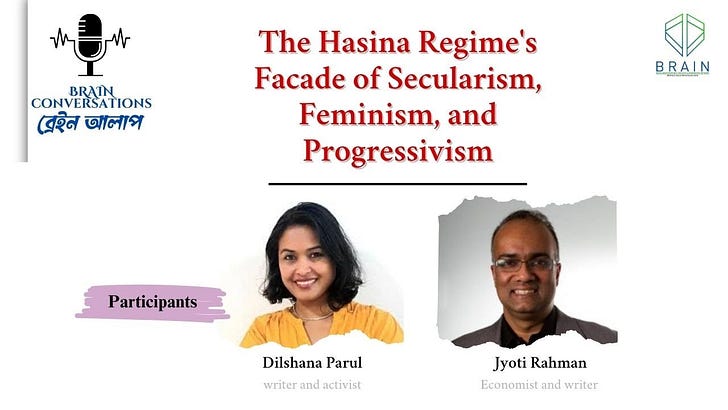A conversation on culture wars in Hasina's Bangladesh
Hasina regime's facade of secularism, feminism, and progressivism
Dilshana Parul and I talked about how the Hasina regime vulgarised liberal ideals and used the urban affluent class’s fears and cultural cleavages for its political end.
Further reading
The best books on The Future of Islam
recommended by Ziauddin Sardar, 1 June 2010
She was trafficked into a giant brothel. Now she runs it
Corinne Redfern and Ali Ahsan, 19 Feb 2021
The Best Books on Gender Inequality
Recommended by Linda Scott, 16 March 2022
Only 22% women employed in Pakistan, among lowest in the world: World Bank
Sandeep Sharma, 10 Feb 2023
Western values are steadily diverging from the rest of the world’s
The Economist, 3 Aug 2023
Anisha Sharma, 27 Oct 2023
South Africa to introduce shared parental leave after landmark judgment
Sarah Johnson, 11 Nov 2023
From Emily Post to Netflix’s Mind Your Manners, etiquette never goes out of style
Allie Volpe, 22 Jan 2024
Who are the world's most influential philosophers?
Alice Evans, 10 April 2024
The fight against child marriage needs a new narrative
Hossain Zillur Rahman, 6 May 2024
Pride Month is a secret celebration in Bangladesh
Redwan Ahmed, 26 June 2024
Online activists reveal how memes became a powerful dissenting tool during the stifling Awami regime
Faisal Mahmud, 30 Nov 2024
Here is to ending the politics of fear



To add a few points to my previous comment.
In the early 2010s, when the intellectual zeitgeist was turning against neoliberalism and advocating for state-driven development models, Muhammad Yunus remained a principled outlier. While many contemporaries called for increased governmental intervention, Yunus persistently championed a vision of social transformation through individual agency. His model of microfinance and social entrepreneurship represented a profound belief in ordinary people's capacity for collective action—driven not by state coercion, but by an intrinsic moral compass and a commitment to mutual empowerment.
My perspective may indeed be colored by libertarian sensibilities, but it finds resonance in the broader cultural patterns of rice-farming societies across Asia. These regions demonstrate a nuanced approach to economic development: while accepting some level of government intervention, they fundamentally resist the European-style welfare state model. This stands in sharp contrast to the Islamist narratives in Bangladesh, which paradoxically advocate for a state-centric, religion-based redistribution system that fundamentally misunderstands the region's organic social dynamics.
Bangladesh's cultural landscape is far more complex than simplistic narratives of secularism versus religious identity suggest. The prevailing political discourse often misunderstands the intricate dynamics of Bengali nationalism, particularly how political leaders like Sheikh Hasina strategically deploy ethnic identity. Her rhetorical choices—such as consistently speaking Bangla at international platforms despite her fluency in English—reveal a calculated appeal to nationalist sentiment that transcends the shallow Western-centric narrative of secularism.
The notion that Islamist movements genuinely represent the spiritual essence of rural Bengali communities is not just misguided, but fundamentally misunderstands the region's deep-rooted social fabric. Our collectivist ethos is not a product of religious ideology, but emerges from centuries-old agricultural practices—specifically the communal rhythms of rice farming. The attempts to "Arabise" Bengali culture by religious fundamentalists represent an external imposition that fundamentally contradicts the syncretistic traditions of rural Bengal, where religious boundaries have historically been fluid and permeable.
What truly characterizes the Bengali social imagination are institutions of communitarian self-reliance. Organizations like BRAC and initiatives by figures such as Muhammad Yunus epitomize an authentic conservative tradition—one rooted in village-level pragmatism and mutual support, rather than state-driven redistributive politics or globalist agendas. These entities emerged from a genuine understanding of local needs, in stark contrast to urban Islamist movements that are paradoxically more cosmopolitan and less connected to traditional Bengali cultural moorings. Importantly, these civil society organizations demonstrate that true conservatism in Bangladesh is not about religious orthodoxy, but about preserving community resilience and local knowledge systems.